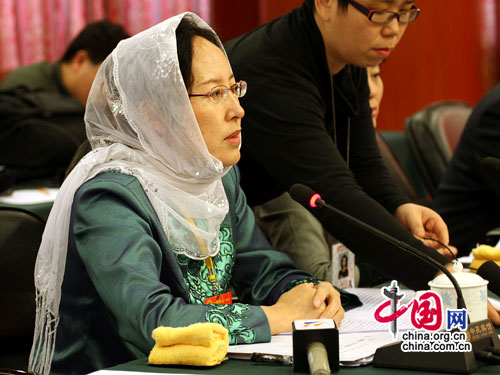Female officials begin to involve key decision-making
In terms of women's participation in political affairs in China, female officials have held more deputy positions than chief ones and more marginal departments than key sectors for a long time.

Most of the Chinese female officials have been promoted from one deputy position to another, and they have never been chiefs during their political career.
He Luli, for example, was appointed as deputy head of Xicheng District of Beijing in 1984. She was promoted to a vice mayor of Beijing four years later. Then she was selected as vice chairwoman of the CPPCC National Committee in 1996 and vice chairwoman of the Standing Committee of the National People's Congress in 1998.
The condition of female participation in political affairs is related to the rules of personnel appointment as well as lack of experience at chief positions for female officials. In 2001, chief female leaders accounted for 1.7 percent, 6.15 percent, 7.05 percent and 3.4 percent among the provincial level, prefecture level, county level and town level officials respectively. The situation has not been greatly improved up to now.
Du Jie, a research fellow with the Women's Studies Institute of China (WSIC), believed that there were many reasons for less female officials with chief positions. "Government departments usually prefer male staff. Female employees aged about 30 are often in their childbearing age when they enter the promotion period," said Du.
The comparatively less complicated job experience of female leaders is also one of the reasons, according to Wu Jiang, a professor of China National School of Administration.
In fact, female officials often concentrate on culture and education, health, science and women's affairs. 50 percent of the surveyed are in charge of culture, education and health, only 15 percent in charge of economic affairs, according to a poll covering 317 female mayors.
But the circumstances are changing. From 2004 to 2005, several senior female officials received promotions and started to get involved in key areas of political and economic policy-making. Examples are Song Xiuyan – appointed as governor of Qinghai, Wu Aiying – selected as minister of justice and Hu Xiaolian – serving as the vice governor of the People's Bank of China and administrator of the State Administration of Foreign Exchange. As the vice chairman of Xinjiang Uygur Autonomous Region, Song Airong is in charge of communications, production safety and information industry. Huang Yanrong, vice governor of Sichuan, is responsible for many economic affairs.
Ma Wen was appointed as minister of supervision in 2007 and then the first director of the National Bureau of Corruption Prevention. She is the third female chief minister currently in office in China.
There are two female secretaries in China's new provincial-level discipline inspection commissions. Female officials account for half of the 2007 China's Ten Outstanding Prosecutors.